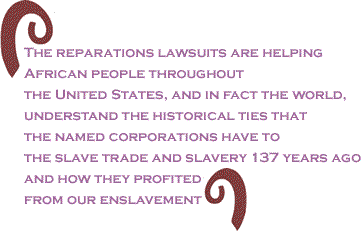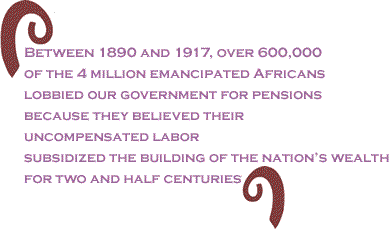
|
|||||||||||||||||||||
 |
|||||||||||||||||||||
 |
|||||||||||||||||||||
 |
|||||||||||||||||||||
 |
|
|
The consolidated reparations lawsuit, originally filed on March 26, 2002 in the United States District Court for the Eastern District of New York, sparked an unprecedented reparations legal court battle that thousands of African people in America have been inspired to support. The next hearing will be held July 21st in Chicago. Since the filing of the March 26th lawsuit, other reparations lawsuits were filed in New Jersey, Virginia, North and South Carolina, Mississippi, Louisiana, and Texas. The group of lawyers and plaintiffs are called, “The Corporate Restitution Team”, led by the law firms of Thomas, Wareham, and Richards of New York and Jean Baptiste and Associates in Chicago.
In December of 2002, it was announced that these reparations lawsuits would be consolidated before Judge Charles R. Norgle, U. S. District Court, Northern District of Illinois, Eastern Division, at 219 South Dearborn in Chicago. Led by the National Black United Front, Chicago Chapter, under the umbrella of the Millions For Reparations Mobilization Committee, the African Community in Chicago made history by packing the courtroom in the first two hearings held on February 26th and again on May 7, 2003. The reparations lawsuits are helping African people throughout the United States, and in fact the world, understand the historical ties that the named corporations have to the slave trade and slavery 137 years ago and how they profited from our enslavement. The named corporations in the lawsuit are: Aetna Casualty, Brown Bros. Harriman, Lloyds of London, Williamson-Liggett Group, CSX Corporation, Loews Corp., Westpoint Stevens, R. J. Reynolds Tobacco, J. P. Morgan Chase, New York Life Insurance, FleetBoston, Union Pacific, Lehman Brothers, and Norfolk Southern. As the National Secretary of NBUF, Toriono Granger reported on the May 7th hearing, “The purpose of the hearings is to work through some procedural issues, to update the court on the status of the consolidation, and to determine if there is reason to go to trial.” Brother Granger further reports, “Since the lawsuits were originally consolidated, additional plaintiffs from California have come forward and now must be consolidated with the other plaintiffs. Motions have been filed to the court by the plaintiffs to preserve the records of the defendants and to prevent the destruction of these records. Motions have also been filed by the attorneys representing the plaintiffs to gain access to these documents so that they may be used to support the case against the corporations. Another pending action in the consolidation is a formalized complaint against the corporations on behalf of all the plaintiffs.” It is clear that the primary strategy of the defendant’s
attorneys has been to find any legal loophole they can As we continue to build the Reparations Movement in America, we must be clear that we are continuing on the path of our ancestors who, from the outset after the Civil War, understood the demand for reparations and began organizing toward that end. We are following in their footsteps. In the book, Should America Pay?, edited by Dr. Raymond A. Winbush, the lead plaintiff on this lawsuit, legal researcher, Deadria Farmer-Paellmann, in her chapter writes that her, “…journey toward building a new approach to slavery reparations led me to the largest mass movement for slavery reparations in American history— the ex-slave pension movement. Between 1890 and 1917, over 600,000 of the 4 million emancipated Africans lobbied our government for pensions because they believed their uncompensated labor subsidized the building of the nation’s wealth for two and half centuries. Nashville, Tennessee was the home of this effort, largely led by a Black woman, Callie D. House— the national spokesperson of the Ex-slave Mutual Relief Bounty and Pension Association.”
Even though the federal government “effectively shot down the movement” in 1917, we should learn from this early Reparations Movement as we continue to press for our just demands for reparations. We should be reminded of the words of their petition to Congress in 1898 by this early Reparations Movement:
Come out and join us in paying tribute to Atty. Lionel Jean Baptiste at the offices of NBUF, 1809 East 71st Street on Thursday, November 16, 2006 at 7:00 p.m. We are seeking donations so that we can show Atty. Baptiste our appreciation for his unsung work on this historic Reparations lawsuit. Conrad W. Worrill, PhD, is the National Chairman of the National Black United Front (NBUF). Worrill’s World appears weekly in BC. |
|
| Home | |
Your comments are always welcome. Visit the Contact Us page to send e-Mail or Feedback or Click here to send e-Mail to [email protected] e-Mail re-print notice
If you send us an e-Mail message we may publish all or part of it, unless you tell us it is not for publication. You may also request that we withhold your name. Thank you very much for your readership. |
|
| November 9, 2006 Issue 205 |
||||||||||||||
|
||||||||||||||
 |
||||||||||||||
|
||||||||||||||
| Printer Friendly Version in resizeable plain text format | ||||||||||||||
 |
||||||||||||||
 |
||||||||||||||
 |
||||||||||||||
 |
||||||||||||||
| |
||||||||||||||
| |
||||||||||||||






























